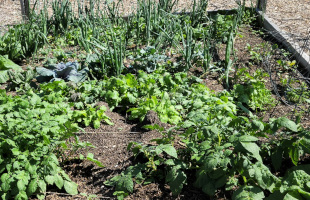
Most people enjoy new gardening products: tools, plants, fertilizers, and other items are fun to try out. However, before you rush out and buy the newest products to use on your garden, consider that just because it is newly approved does not always mean it is better than what is already out there. In fact, sometimes it means it is significantly worse.
Imprelis
Consider the Imprelis fiasco. DuPont tested this herbicide for safety and submitted the data to the Environmental Protection Agency. The herbicide was labeled for use on lawns by professionals with a commercial license. In theory, this meant that only trained personnel were using it on grass to kill weeds.
Major Problems
Almost immediately, there were problems. It seems that Norway spruce, white pine, and other trees were dying in areas where it had been applied. Worse, composted grass clippings from lawns that had been sprayed were also harming trees. It is unusual for a chemical to survive the composting process and still kill plants. Since many municipalities collect grass clippings and other plant debris and compost them or sell them as mulch, this means that one sprayed lawn could potentially contaminate large numbers of gardens.
Problems Snowball
As reports of problems mounted, DuPont issued a letter of caution to professionals about the problem. They then reported the problem to the EPA. Finally, they suspended sales of Imprelis. Now the EPA has banned the sale or use of Imprelis and DuPont is working out details to buy back or issue refends for the product.
Mandated Reporting Helps
Many people have decried this whole episode as a failure on the part of the EPA. Not normally one to stick up for the EPA, in this case I believe the charges are unfair. There is no way to test a chemical against all known plants or organisms. To do so would be cost prohibitive even if it were possible. That is why there are regulations, and laws, in place to mandate the reporting of certain types of data for the life of the chemical. Such reports are used to detect troubling trends in use and problems. Often, labels can be amended to remedy the problem, or the formulation slightly tweaked.
Withdrawing Products
Sometimes, though, that is not enough. In that case, as in the case of Imprelis, the product is withdrawn. Sometimes that product withdrawal is voluntary, sometimes not. DuPont was in the process of doing that when the EPA issued its ruling banning Imprelis.
Costly Mistake
This will be a costly problem for DuPont. In addition to losing all the time and money spent on developing a product it cannot now sell, DuPont must buy back sold products, pay for damage to property, and will undoubtably be sued. While in some ways they deserve what they get, in others, we all bear some of the responsibility for the problem.
Using Quick Fixes
As consumers, we demand new and improved products constantly. We over use existing products until they are no longer effective or use them against things they were never inteded to kill. We insist on a chemical solution instead of using biological and cultural controls to grow things well. Finally, we insist on huge expanses of perfect lawn: a water hungry desert devoid of food for most birds and animals. Instead, we should be growing plants that are native and adapted to the rainfall and weather in the area. In addition to needing far less water and fertilizer, such plants support more wildlife and fall prey to fewer diseases.
Use Caution
In other words, the latest and greatest might be neither. Wait when new products come on the market if at all possible to see if there will be problems. Garden responsibly and use resources wisely. Then enjoy your garden without guilt or the fear that you are poisoning yourself and your family with the products you use.

Want to learn to garden? My first attempt at gardening ended up in failure. The weeds took over and squeezed the vegetables out. I was very frustrated by this waste of good seed, time, and money. So I became a master gardener and spent a lot of time helping other people avoid or overcome problems in their garden.
In order to help others garden successfully, I have written a book, Vegetable Gardening from the Ground Up, available in an ebook or a paperback from Amazon. It is also in Kindle Unlimited.

